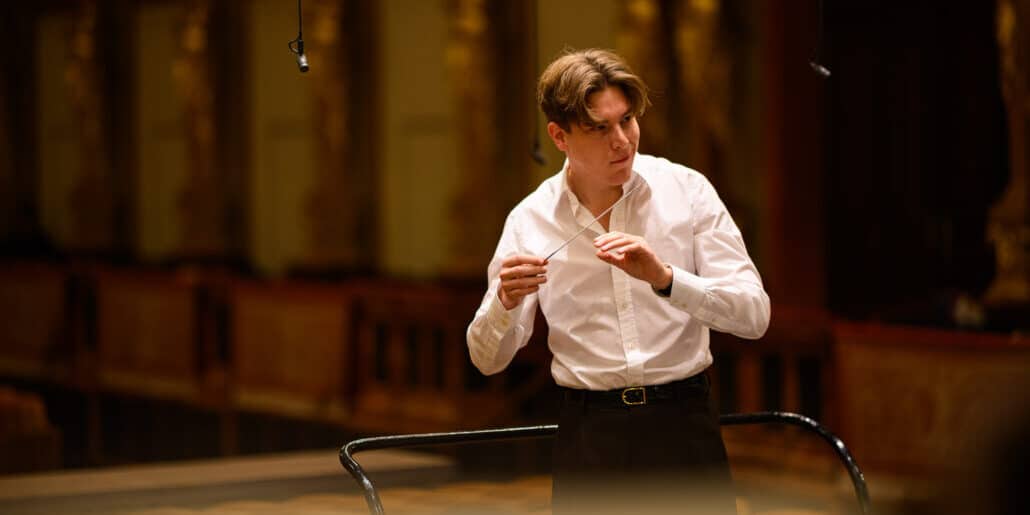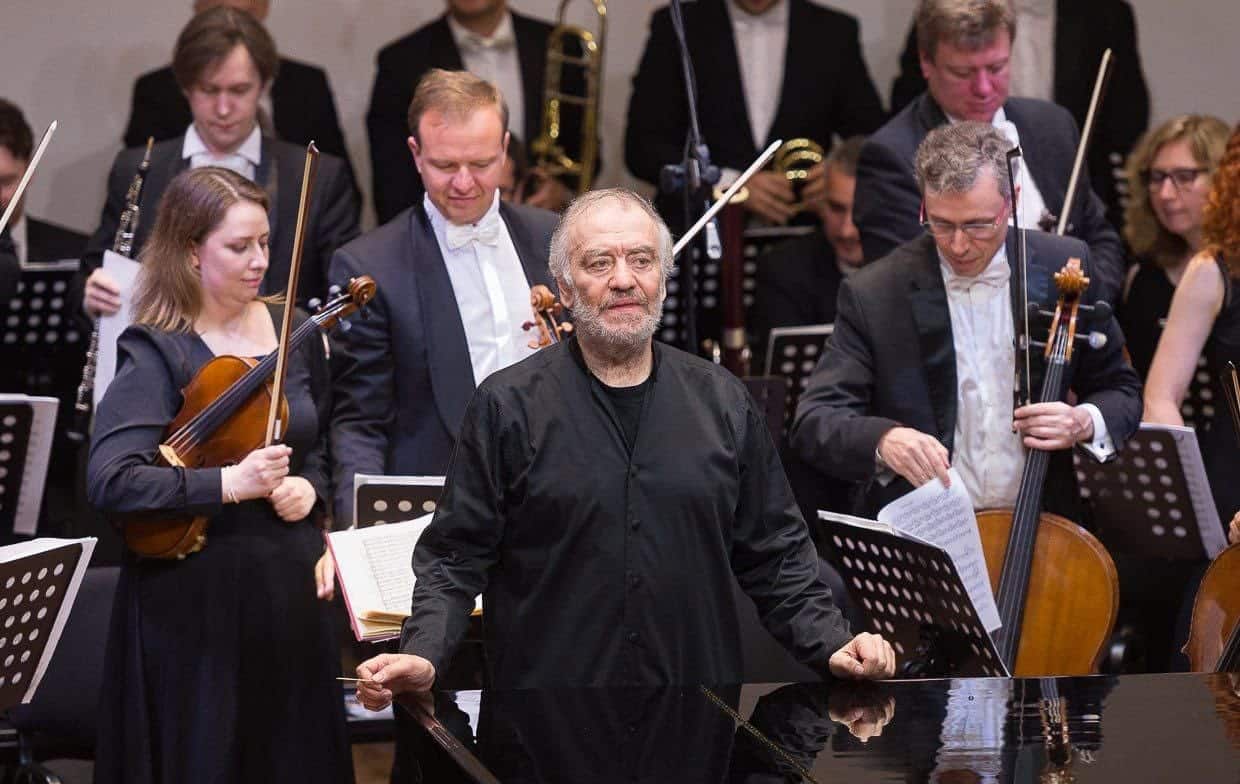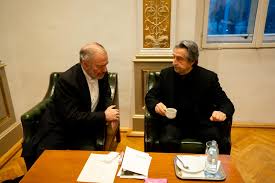UK ensemble wins 75k Siemens award
mainThe British UK contemporary music group Riot Ensemble has netted 75,000 Euros as one two inaugural recipients of the Ernst von Siemens Music Foundation’s Ensemble Prize.
The other winner is the Lithuanian ensemble Synaesthesis.

Ready for a riot?
Tweet from the founder:
Ten years in. Some 300 premieres spread across 126 concerts and this truly amazing news. I couldn’t be more proud of @RiotEns or happier to be back in the rehearsal room as we look forward to @wienmodern this week. Thank you @EvS_Musik for this incredibly special recognition!!! https://t.co/JonIO5nKvV
— Aaron Holloway-Nahum (@AaronHNahum) November 11, 2020





A fossile from the progressive camp of the last century.
This ensemble is “Supported using public funding by the Arts Council”.
This gives an impression of the repertoire presented by the group:
http://riotensemble.com/category/media/video/live-performances/
Also some videos on these pages:
http://riotensemble.com/zeitgeist/
http://riotensemble.com/tag/piano/
Civil servants have come to believe that this sonic art is a form of music, and ‘avantgarde’, just like the sixties of the last century, and that audiences have not caught-up in that half century, so it has to be supported by tax money to preserve it for a posterity with a ‘better understanding’. And of course the Siemens Foundation wants to keep the nonsense in place because they believe that it gives them the aura of being ‘entirely modern’ and thus, NOT fascist. Here we see the workings of an ideology in all its stupid nakedness.
PS:
In formerly by Russia occupied countries, sonic ensembles try to catch-up with the West, and choose the progress of 50 years ago. Here are some samples by Lithuanian ensemble Synaesthesis:
https://www.youtube.com/watch?v=QNpBZjTpdS4
https://www.facebook.com/ensemblesynaesthesis/videos/-in-fahrenheit/504998929980628/
https://m.facebook.com/ensemblesynaesthesis/videos/376154376900488/?refsrc=http%3A%2F%2Fwww.google.nl%2F&_rdr
I’m not giving a very personal opinion, but show the obvious self-defeating exercises that quite some people don’t see through, including the performers.
Who would be interested in such poor forms of sonic ‘progress’ of an entirely outdated and flawed world view? Something that was a half-baked, silly attempt half a century ago by people without interest in music?
John Boreslap says: “And what IS a t-shirt?”
“Contemporary music”. Essentially this is funding to create noises resembling a worn out bilge pump running out of diesel.
If only 35% of the UK population listen to some form of classical music, what proportion of this would actually stomach this shite?
None Ulick, it is just like the young British artists comic strip in Private Eye. No one I know likes “sonic arts” it has nothing to do with real music.
Well-deserved congratulations to these hardworking, inspiring musicians who are remaining active and flourishing despite the global catastrophe (and the SD comment brigade) ripping apart the performing arts.
Quite agree. I’ve heard them at HCMF a number of times and they’re terrific. Sadly I knew in advance what many of the comments here would be like.
From the Riot Ensemble’s Zeitgeist commission homepage:
“Alongside the live-streams, the living-room concerts, the short clips of practice and connection that are streaming out anew, we wanted to continue to make what we make best: work that employs composers and performers in paid opportunities to create music together.his is why – in partnership with Zeitgeist.com – we launched a new series of short solo commissions through which we paid composers more than £19,000 to write new solo works for our musicians over the coming weeks and months.”
What is so wrong with that? When, after reading John Borstlap’s diatribe, I plucked up my courage to listen to some samples, I quickly found two beautiful ones: for contrabassoon, ‘Salamander’ by Zoe Martlew, and for cello, ‘Sky Dance’ by Ailie Robertson (both on YouTube). (Admittedly, there was also some of the ‘bilge pump running out of diesel’ variety, but then again, there is some baroque music hardly worth listening to either.)
Now that YouTube is up and running again after its outage, I was able to look for “Salamander.” I found it with solo bassoon, but not contrabassoon. I’d love to have a link to the contrabassoon version, if you have it. (Or perhaps you meant bassoon?) Thanks for bringing it to my attention.
No, William, I got it wrong, I should have said bassoon. It just looked so huge (or perhaps the player was tiny)!
Ok, thanks. I was intrigued at first because there is so little solo literature written for the contrabassoon. (For that matter there isn’t a huge catalog for bassoon either.)
I did a quick search to see if the music has been published. I didn’t find it. I’ll look again.
A really stupid mistake, I don’t know what I was thinking. I would never mistake a cello for a double-bass!
It is fine to say “this is not at all to my taste.” It is not so fine to continue, “therefore, it cannot meet anyone’s definition of music.”
And it is laughable to tar the entirety of contemporary music, which includes so much that is tonal and tuneful, as bilge-pump noise.
It is not laughable at all. The fact is audiences don’t come to hear contemporary stuff, they come to hear old favourites, Byrd, Tallis, Bach, Handel, Purcell, Mozart, Haydn, Beethoven, Schubert etc.
Bilge music does not attract bums on seats mate.
Just as well, then, that Tudor audiences did not want to hear only Dunstable and Dufay, thus abandoning Tallis, Byrd et al to poverty and oblivion.
Concerning audience reception: all good music incorporating the triadic radiance, is accessible to the ear and heart. All good 20C music with lots of dissonances in it, is much less accessible because of the rubbing of the harmonic series, i.e. sounds don’t blend so well and it is much harder to hear the inner logic. All good sonic art is not only rather inaccessible because of a general level of dissonance and dissociation, but because it has no narrative and no direction. All bad music with lots of triads in it, is merely boring. But it has become quite hard to write good music with triads.
Somewhat akin to listening to barbed wire, I was nonetheless thankful Riot Ensemble programmed the Carter Double Concerto on one occasion. It’s interesting how pieces held dear in ones teenage years change in ones perception over time.
Here it is:
https://www.youtube.com/watch?v=sebIvdCHcCE
Full-blown neurosis pays-off if offered at the right time at the right place.
After having indulged in mediocre neoclassic music, which everybody was writing around the fourties, Carter jumped on the modernist bandwagon and suddenly got a ‘career’. Since he never had to work for his subsistence, he finally found something nice to do, which was in the same time giving meaning to his life. This meaning was: giving voice to the psychiatric problems of his times wihtout having to translate them into music, but simply presenting them.
Lest there be any doubt I don’t have any problems with modernist music per se. I’m just referring to this particular piece/composer. Let’s please go on a case by case basis rather than sweeping admonishments of style. For instance, at his best Babbitt wears better ( to my ears anyway )and I have a soft spot for Carter’s Piano Concerto and the opening of the Symphony for Three Orchestras.
PS
Sorry about this particular performance, I heard a wrong note at 15:39.
Which one, John?
It’s a d’ in the piano (you can check it out with a tuning fork). But I remember it being a different note in the performance I had to endure in NY in 2004. But now I begin to doubt, maybe the wrong note was in that NY performance. I’ll need to check it in the score.
I don’t know about Carter, but Gunther Schuller (whom I last saw in that hall, albeit not at that concert) was definitely capable of hearing music with a high enough level of discernment to identify a wrong note in that way. My guess is that Knussen could also do so. Ditto others.
I know you’re mocking the music, but there are people who can hear music that well.
Charles Rosen plays a beautifully strong D at precisely the moment you mention ♂️
A performance can also have a positive — or negative — impact on one’s perception of the music.
For example, for a number of years I felt that the Carter wind quintet was thorny modernist music. (To be clear, for me, that is a descriptive, not a pejorative.)
Most quintets seem to perform it that way–certain ones more successfully than others.
Then, one time, I heard a stellar performance of it that made me realize that my impression was all wrong–it is really neoclassical. Of course it’s neoclassical on the page, but it’s the first time that I heard a quintet bring the neoclassicism to the foreground.
Both my impression of the piece and my appreciation of it were changed for the better. Ditto the ensemble.
Uptick, William. It’s not what you play, it’s the way that you play it!
Here it is:
https://www.youtube.com/watch?v=zM7dsOYMWgI
For a neoclassical piece, I find it pretentious, empty, willfully complex without a real musical motivation. In the end, Carter’s work is mediocre and superficial.
Compare with this:
https://www.youtube.com/watch?v=oVBfv9r3G4o
Also not ‘deep’, but it has musical Schwung, charm, and sheer pleasure, qualities which were for Carter apparently very hard to achieve.
I literally have the Poulenc Sextet on my music stand as I type this. It is fun, frothy, playful, surface-y Gallic music.
That is a good performance of the Carter quintet: not as good as the one I referenced in my previous message, but definitely better than many others that I have heard. The players do a decent job of capturing the dry wit that one sometimes finds in Carter’s music, and bringing out the contrapuntal lines.
The 1948 quintet is definitely more accessible than his quintet “Nine by Five,” which he wrote when he was 101 years old!
I like the Carter quintet a lot. It has more depth than, say, the Poulenc. It pairs well with the Francaix first quintet. In fact, Carter used to request that the Francaix be paired with his quintet in performance.
Fun piece of trivia: Carter and Francaix used to take the bus together to and from their lessons with Nadia Boulanger. If I remember the story correctly, Francaix was inspired to write his first quintet by Carter’s quintet. Or it could be the other way around–not sure. I know people who heard the story directly from Carter, and from Francaix–I can ask them next time I cross paths with them.
The Double Quintet is an unusual piece, needless to say, and not my cup of tea, but apparently it was inspired by his appreciation of the music of Charles Ives, whom he knew and liked.
*Double Concerto